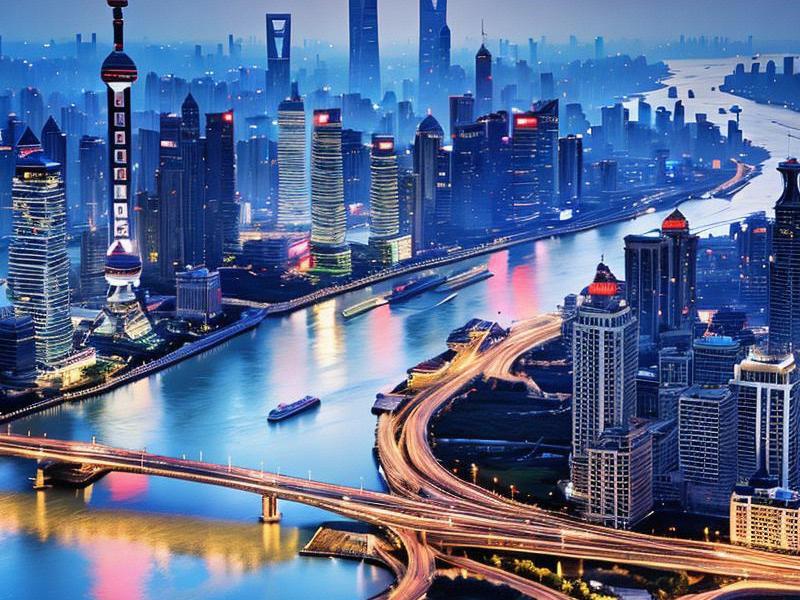
Shanghai, the largest city in China, has long been a symbol of the country's economic transformation and modernization. Situated at the mouth of the Yangtze River, Shanghai is not only a major financial center but also a hub for trade, innovation, and cultural exchange. Over the past few decades, the city has undergone rapid urbanization and economic growth, making it one of the most dynamic cities in the world.
The economic rise of Shanghai is closely tied to its strategic location and the broader development of the Yangtze River Delta (YRD) economic zone. The YRD, which includes Shanghai, Jiangsu, and Zhejiang provinces, is one of the most economically developed regions in China. Together, these areas account for a significant portion of the country's GDP and exports.
Shanghai's economic success is evident in its skyline, which is dotted with iconic skyscrapers such as the Shanghai Tower, the Oriental Pearl Tower, and the Jin Mao Tower. These buildings symbolize the city's status as a global financial hub. The Shanghai Stock Exchange (SSE) is one of the largest stock exchanges in Asia, attracting investors from around the world. The city's port, the Port of Shanghai, is the busiest container port globally, handling millions of containers annually.
One of the key factors behind Shanghai's economic prowess is its role as a gateway to China. The city serves as a major hub for international trade, with its port facilitating the movement of goods between China and the rest of the world. The development of the Free Trade Zone in Shanghai has further enhanced its role in global trade. The zone offers various incentives to foreign investors, including tax breaks and simplified administrative procedures, making it an attractive destination for multinational corporations.
爱上海同城419 In addition to trade and finance, Shanghai is also a leader in innovation and technology. The city has invested heavily in research and development, fostering a vibrant startup ecosystem. Areas such as Zhangjiang Hi-Tech Park and漕河泾开发区 (Chuancheng Development Zone) have become incubators for high-tech companies, attracting talent and investment from across the globe. Shanghai's commitment to innovation is reflected in its initiatives to promote artificial intelligence, biotechnology, and green energy.
The surrounding areas of Shanghai, particularly the Yangtze River Delta, play a crucial role in the city's economic success. Jiangsu and Zhejiang provinces are known for their strong manufacturing bases, advanced technology industries, and vibrant private sectors. Cities such as 苏州 (Suzhou), 无锡 (Wuxi), and 宁波 (Ningbo) are major industrial and commercial centers, contributing significantly to the regional economy.
The integration of Shanghai with its surrounding areas has been facilitated by the development of transportation infrastructure. The 高铁 (high-speed rail) network connects Shanghai to major cities in the Yangtze River Delta, enabling the efficient movement of people and goods. The expansion of the Shanghai Metro system has also improved urban mobility, making it easier for residents to commute and access services.
上海龙凤419油压论坛 Shanghai's economic influence extends beyond the Yangtze River Delta and China. The city is a member of the Global Cities Initiative, a partnership between the Brookings Institution and JPMorgan Chase, which recognizes its role as a global economic leader. Shanghai's initiatives to promote international cooperation and cultural exchange have further enhanced its global standing.
One of the most notable examples of Shanghai's international influence is the 上海合作组织 (Shanghai Cooperation Organization - SCO). Although primarily a security organization, the SCO also promotes economic cooperation among its member states, including China, Russia, and several Central Asian countries. Shanghai's leadership in the SCO reflects its commitment to fostering regional stability and economic development.
Culturally, Shanghai is a melting pot of tradition and modernity. The city is known for its blend of Eastern and Western architectural styles, as well as its vibrant arts and entertainment scene. The 外滩 (Bund), with its historic buildings and stunning views of the Huangpu River, is a symbol of Shanghai's rich history and cosmopolitan character. The city's museums, theaters, and music venues attract millions of visitors each year, contributing to its status as a cultural capital.
爱上海419 Despite its economic success, Shanghai faces challenges such as urbanization, environmental sustainability, and social inequality. The city has implemented various measures to address these issues, including the promotion of green development and the improvement of public services. Initiatives such as the 上海自贸区 (Shanghai Free Trade Zone) and the 长三角一体化 (Yangtze River Delta Integration) plan aim to enhance the city's competitiveness and sustainability.
The future of Shanghai and the Yangtze River Delta looks promising, with continued investment in innovation, infrastructure, and environmental protection. The Chinese government's Vision 2035 plan envisions Shanghai as a global leader in innovation, finance, trade, and culture. The city's ability to adapt to global economic trends and challenges will be crucial in maintaining its position as an economic powerhouse.
In conclusion, Shanghai and its surrounding areas represent a significant part of China's economic success story. The city's rapid development, strategic location, and commitment to innovation have made it a global hub for trade, finance, and culture. As Shanghai continues to grow and evolve, it will play an increasingly important role in shaping the future of the global economy.
